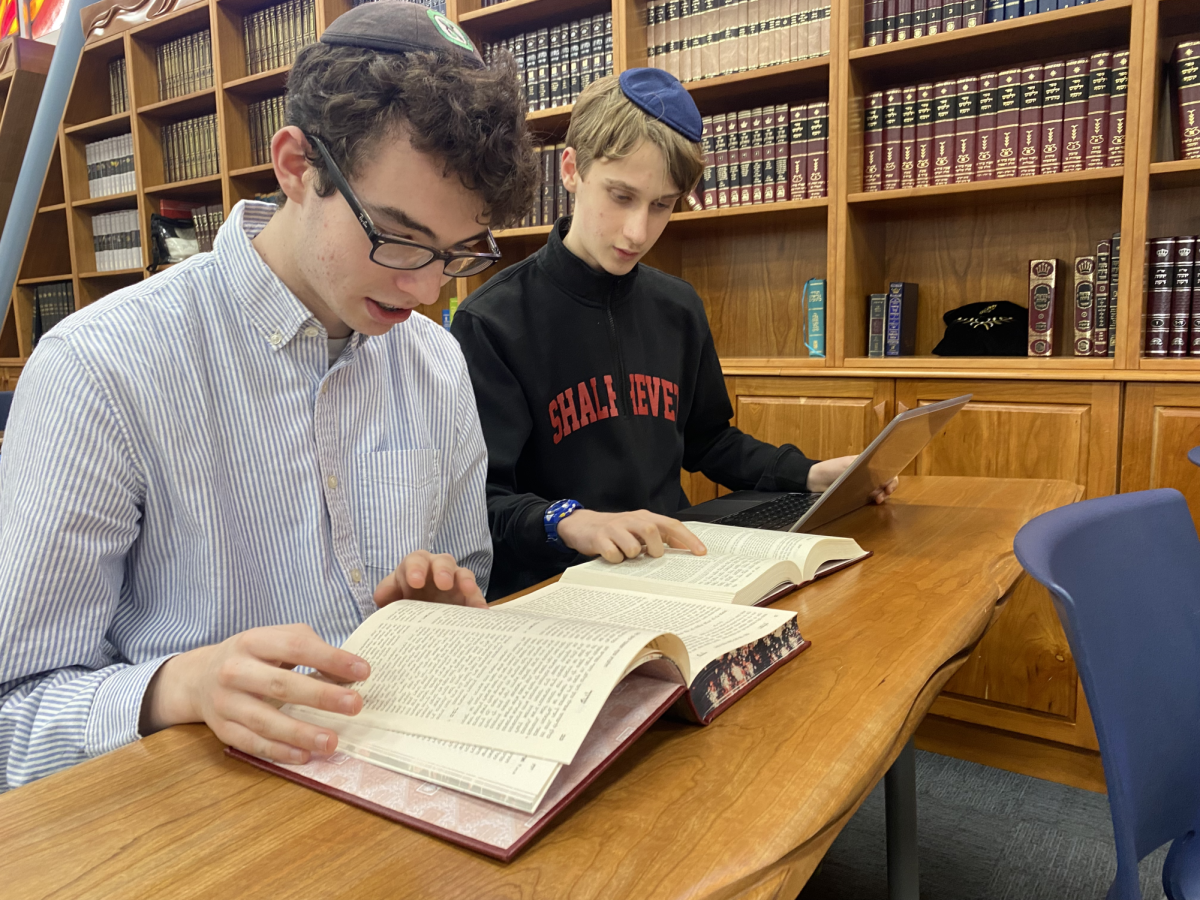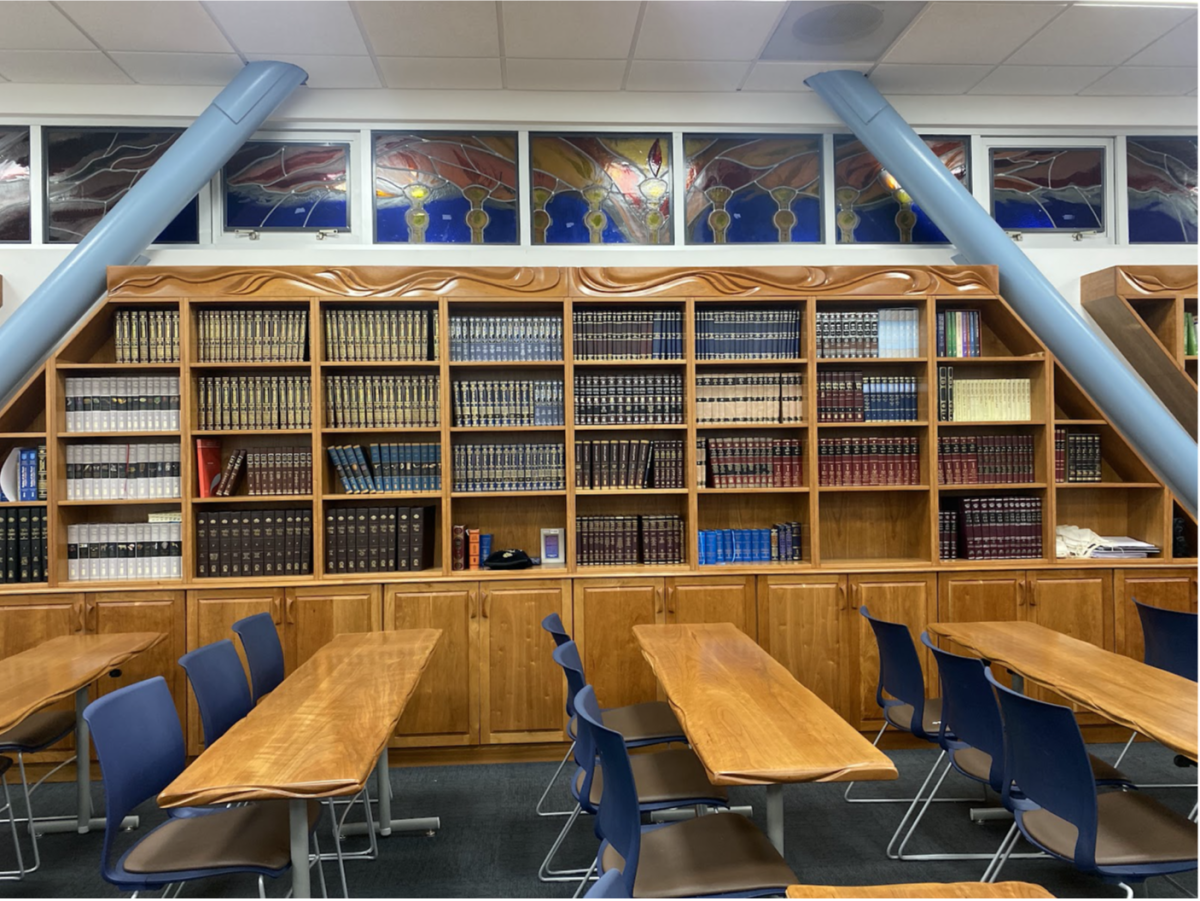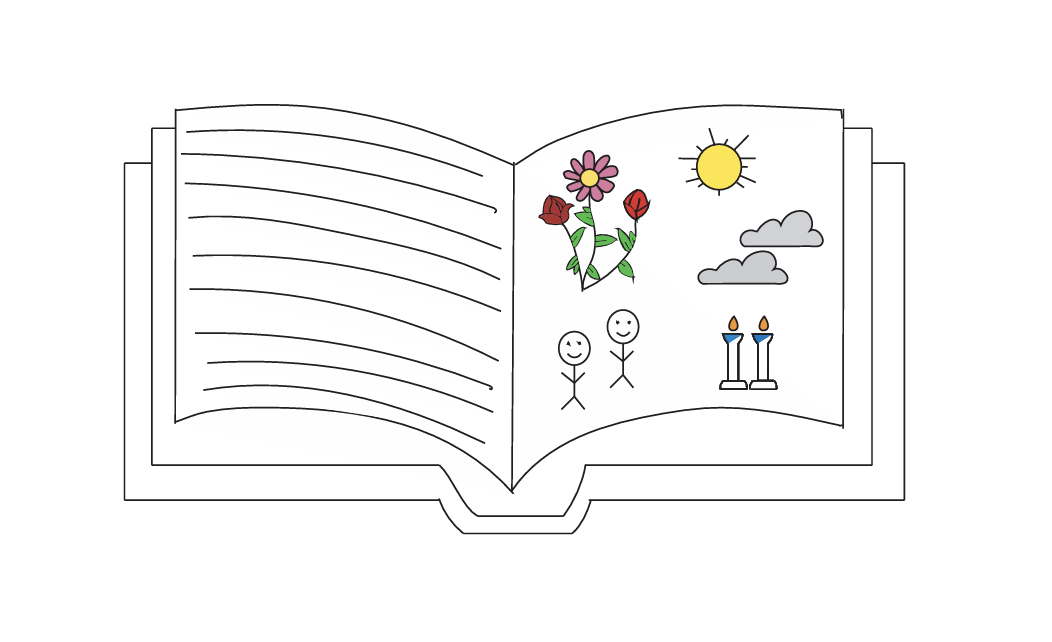It was Tuesday, Feb. 21, and Rabbi Ari Schwarzberg was telling a room full of seniors and faculty that their spring coursework had been created with the intention of “giving the knowledge and information for later on in your life, regardless of if you are religious or not at this moment.”
At that moment, members of the cooking class scrambled in late, with oily hands, putting finishing touches on dishes they’d cooked to represent foods from ancient Jewish communities.
It was all part of the new “mini-mesters” system, which divides seniors’ second-semester Judaic Studies curriculum into several mini-semesters (hence the name) in which they choose among from a menu of seminars, instead of attending regular classes in Gemara, Tanach and Jewish philosophy andJewish history.
Ever since the semester began, during second and fourth periods – which used to be their Tanach and Gemara classes – 12th graders have been taking two electives they have chosen. Their eighth period, which had been Jewish History or Jewish Philosophy, is now free.
“It’s so much less stressful and more fun than taking our normal classes,” said senior Deanna Grunfeld, as she described her Judaic Studies classes this semester – or rather, her lack of Judaic Studies classes.
That seemed to be exactly what the program had in mind. Developed by Rabbi Schwarzberg along with Mr. Feld, Rabbi Leubitz, and Noam Weissman, it started on Jan. 30 and culminated in its first shared presentations in the Beit Midrash Feb. 21. Five more sessions are planned, each lasting two to three weeks.
“It’s unfair of us teachers to expect second-semester seniors to take tests, and homework very seriously, once they’ve already submitted their college applications, etc.,” said Rabbi Schwarzberg.
“So we tried to think of something that the students would enjoy doing everyday, and that they will carry though the rest of their lives.”
The smell of the different exotic foods quickly filled the room, as the seniors in the cooking class pushed each other to arrange the dishes on the table. Other seniors began taking peeks at the table in the corner and whispering to one another, as they looked anxiously at what they would eventually eat.
“I think it was really cool,” said senior Ashley Hakimbaba. “Everyone had it as their lunch.”
The main subject of the first mini-mester was Jewish identity. In addition to the food seminar – titled “A Plate-full of Identity” and taught by Mr. Feld – were Jewish Identity through the Fine Arts, with Art and Performing Arts Department chair Mrs. Roen Salem and Judaic Studies teacher Mrs. Ruthie Skaist; and Jewish Identity through Media/Literature/Drama, with English and Judaic Studies teacher Mrs. Batsheva Frankel.
Mr. Weissman taught Jewish Identity through Text, and Jewish Identity through Biography was taught by Rabbi Shmuly Yanklowitz.
Senior Nathan Rossi, who took the media, literature, and drama mini-mester, focused on the Jewish filmmaker Woody Allen.
“His struggle with religion really inspired me,” Nathan said.
The arts class explored iconic pieces of Jewish art, allowing the students’ to explore their artistic ability through drawing, painting, or reproducing works themselves.
In the cooking course, seniors explored ancient Jewish cookbooks and cooked foods of the earliest Jewish communities. They also volunteered at Tomchei Shabbat, which anonymously delivers groceries to needy families around L.A.
The class learned about foods in Ashkenaz and Sephardic communities, in both ancient and modern times. Students conjured up dishes that ranged from malawa,* an ancient bread from Yemenite Jewish communities, to barish,* a meal originating in Portugal and Sicily, to hummus.*
Students also tried to experience how their ancestors made the original dishes they were replicating.
“It was really authentic, because we didn’t have any instruments, so we literally had to make everything by hand,” said senior Raquel Garshofsky, who presented the course to faculty and seniors. “Not only did I learn, but I built memories through the process.”
The Feb. 21 event gathered all courses in the Beit Midrash during 4th period and began with a short film made by senior Yonah Nimmer, interviewing students and teachers and showing scenes of the classes in action.
Senior Karen Tal said she hoped to display her artwork at home.
“I think it’s something my dad will really like and appreciate,” Karen said.
Leah Katz, a representative of the text class, explained that her class focused on writing a journal, and that hopefully one day it would be published and printed.
“The text class was very intense,” said Adam Ashkenazi. “It was very different from my initial expectations. It really challenged me, whereas originally, I thought it would just be a time to sleep.”
A second short video showed the Biography course, and who the students in the course considered their heroes to be and why.
Eitan Spitzer described looking into what constitutes a hero, and then finding personal heroes ranging from Kobe Bryant for his dedication to his dream, to his grandfather, who “came from nothing, who worked his way up, and built a family and a life for himself.”
The final mini-mester unit presented was on the topic of kashrut. A variety of speakers, including Rabbi Yosef Kanefsky of Bnai David-Judea, had visited school to talk to the seniors about observing kashrut* once out of high school. Topics included what students can eat on a college campus, ways to keep a kosher kitchen and what to do if one by accident uses a dairy utensil for a meat stew.
Beginning the second week of March, the mini-mester topic is Shabbat. The seniors have split into several groups to discuss the reasoning behind what constitutes as “work” on Shabbat, and gathered as a grade to examine the topic together.
I’m not jumping out of bed to go to school every morning because of it, but it’s definitely a lot more exciting than the same-old, standard Judaic classes, Deanna Grunfeld told the Boiling Point.
“While there is always that feeling of ‘I’m a second-semester senior, why am I here’ that everyone is thinking, the concept of the mini-mesters and the topics we discuss are really great and relevant,” said Michael Silver. “Hopefully I’ll actually remember what I’m learning.”







